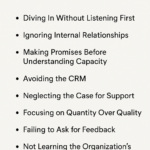Top Mistakes Fundraisers Make in Their First 90 Days

Starting a new fundraising role at a charity is both exciting and daunting. The first 90 days are critical for setting a solid foundation, building credibility, and establishing relationships. Unfortunately, many fundraisers—particularly those newer to the sector or transitioning into a more senior role—make avoidable mistakes that can stunt their long-term success. Here are the top missteps to watch for in those crucial first three months.
1. Diving In Without Listening First
Mistake: Acting before observing.
Why it happens: Eagerness to prove value or fix what seems broken.
Impact: Alienates colleagues, donors, and key stakeholders; leads to misaligned strategies.
What to do instead: Spend the first few weeks listening, absorbing, and understanding the organisation’s history, donor base, systems, and culture. Ask more questions than you answer. Learn what has worked, what hasn’t, and—most importantly—why.
2. Ignoring Internal Relationships
Mistake: Focusing solely on external donors without building rapport internally.
Why it happens: A belief that fundraising is “all about the donors.”
Impact: You become isolated, miss critical support from colleagues, and struggle to integrate your work with organisational goals.
What to do instead: Prioritise relationships with program staff, finance, communications, data teams, and leadership. Understand their roles and build mutual trust. Fundraising success hinges on cross-functional alignment.
3. Making Promises Before Understanding Capacity
Mistake: Over-promising revenue outcomes or quick wins.
Why it happens: Pressure to impress or a misunderstanding of the donor landscape.
Impact: Missed goals, damaged credibility, and loss of trust from leadership.
What to do instead: Set realistic expectations. Provide an assessment period before committing to stretch goals. It’s better to be conservative early and exceed expectations than the reverse.
4. Avoiding the CRM
Mistake: Underusing or ignoring the charity’s CRM system.
Why it happens: A preference for spreadsheets, fear of learning a new system, or underestimating its importance.
Impact: Poor data hygiene, lost donor insights, duplication of effort, and lack of transparency.
What to do instead: Get trained on the CRM immediately. Learn how to log interactions, analyse data, and use it to inform your strategies. CRM competency is non-negotiable for modern fundraisers.
5. Neglecting the Case for Support
Mistake: Jumping into asks without refining or understanding the organisation’s case for support.
Why it happens: Pressure to bring in funds quickly or assuming a generic pitch will suffice.
Impact: Uninspiring appeals, donor confusion, and missed opportunities.
What to do instead: Ensure your messaging is clear, compelling, and aligned with the organisation’s strategy and impact. If it’s weak, lead the effort to refine it.
6. Focusing on Quantity Over Quality
Mistake: Trying to contact as many donors as possible instead of prioritising meaningful engagement.
Why it happens: KPI anxiety or a misunderstanding of donor relationship depth.
Impact: Shallow relationships, missed major gift opportunities, donor fatigue.
What to do instead: Focus on building a portfolio of qualified, high-potential donors. Schedule meaningful conversations. Prioritise listening over pitching in those early interactions.
7. Failing to Ask for Feedback
Mistake: Operating in a vacuum.
Why it happens: Fear of appearing incompetent or a desire to prove you’ve got it all under control.
Impact: Missed opportunities for course correction and professional growth.
What to do instead: Ask your manager, peers, and donors for feedback. Early and often. It shows maturity and a willingness to grow.
8. Not Learning the Organisation’s Finances
Mistake: Ignoring the numbers behind the impact.
Why it happens: Fundraisers often default to the emotive side of storytelling.
Impact: Weak donor cases, lack of confidence when discussing funding needs, and an inability to answer financial questions credibly.
What to do instead: Sit with the finance team. Learn your budget, how unrestricted funds flow, and what it truly costs to deliver your programs. Financial fluency builds donor trust.
The first 90 days in a new fundraising role are your opportunity to observe, learn, and establish a firm footing. Avoiding these common mistakes won’t just make you a better fundraiser—it will position you as a strategic, credible leader who can drive long-term impact.
Every misstep is a chance to improve. But in fundraising, perception matters. The earlier you build trust and demonstrate thoughtful, informed action, the more effectively you can deliver for your organisation—and its mission.
